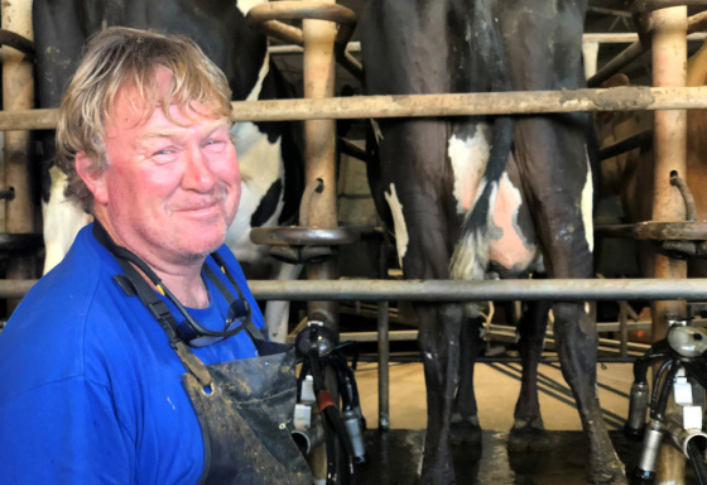Posted by on
14/04/2023
Con and Deanna De Bondt did not think of themselves as organic people, but thanks to a philosophy of thinking outside the square, the De Bondts’ turned their once conventional dairy farm into a successful certified organic dairy business.
In a bold move to ensure the future sustainability of their business, the couple embarked upon the organics pathway and within three years had obtained their organic certification.
It was a massive change, but that’s not something either Con, nor Deanna have ever shied away from.
Con was working in the printing industry, and Deanna was in advertising when they decided to leave behind their careers in Western Australia to take over a small farm from Con’s parents in South Gippsland, Victoria.
In the 30 years since, they have grown their farm from its original 132 hectares to 561 hectares, and are currently milking around 450 cows.
Con said that, over time, they had completely demolished their farm and rebuilt it from the ground up.
What we are about is trying to maximise profit per cow and developing and protecting complete sustainability for now and the future.
“We can produce as much milk as we wish and almost as little as we wish,” Deanna pointed out.
“The ‘Certified Organic’ market can’t get enough milk at the moment, so of course, they like us to produce more than less.”

The 'Certified Organics' journey
Deanna is quick to admit that going certified organic created a very big learning curve for them both.
It was a learning curve that we’ve been very, very happy to take – especially the more we have gotten into it, she added.
With conventional farming, we found that we were continually in either a peak or a trough with the price, the weather, or some other thing.
In the end, we found ourselves in the position of saying we don’t want to play this game anymore, we need something that is sustainable. Once we explored the avenue of certified organic farming, it was a no brainer.
“We had to make a change, so we forced ourselves to change,” Con said.
And, he added, when we needed Rabobank support, we got it.
“They’re one bank, probably the only bank, that allows for a square peg in a round hole,” he said.
“Rabobank had the ability to think outside the box and they also had the ability to see the big picture. Russell comes out on farm regularly to keep up to speed.”
Adding her own thoughts, Deanna said right from the beginning, Rabobank staff had been supportive, and that their relationship manager Russell Mann was particularly amazing.
Going gangbusters
With their transition to certified organics, Con said they now have the ability to be super profitable.
“I believe the certified organics model of dairying is going to be the only true sustainable way to be profitable unless, on the conventional side, milk companies start lifting the milk price,” he added.
Con described their journey of switching to organics as effectively going cold turkey, with no fertiliser, no feed inputs, or anything.
The circumstances affecting the whole dairy industry at the time, he said, forced their hand.
Those three years were a very tough journey, but with Rabobank’s support we are now going gangbusters and feel we are on the right path.
Getting to that point has meant finding alternative methods for dealing with everything from animal health to weeds.
For example, they use honey rather than antibiotics in the treatment of mastitis and they control weeds through manual hoeing and mulching rather than spraying.
“One of the things we’ve learned is that we can fix a lot of things without antibiotics and the only time you really need an antibiotic is to save an animal when it’s really sick,” Deanna said.
“There are a lot of remedies out there that date back to old wives’ tales, some of them work and with some of them it’s debatable if they work.”
“You just basically have to think outside the square, use trial and error,” Con added.
Forwards, not backwards
The key to their ongoing success, Con and Deanna agree, is to be self-sustained – using only their own organic feed and their own water.
And regardless of the weather conditions, Con said confidently that they’ll never run out of water.
“We built our own dam in 2000 and have a 600+ megalitre water right. We can irrigate, we can do what we need,” he said.
Now that they’ve made the switch to ‘Certified Organic Farming’, Deanna said that they would never look back.
“A lot of the things we do now, we would have used in our conventional farming if we had the knowledge that we have now,” she said.
“It’s certainly made us think a lot more. It has a really good feel about it and you know that you’re doing something right.”
